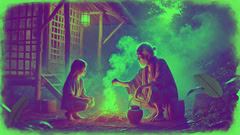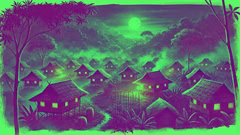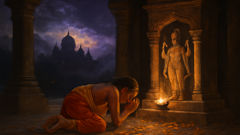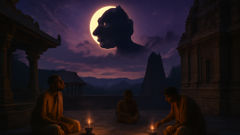Introduction
In the dense thickets of bamboo and beneath the stoic, spreading arms of ancient acacia trees, there exists a hush that falls over the Visayan landscape as dusk approaches. The air grows heavy and wet, fragrant with the scent of carabao grass and the distant smoke of cooking fires. Cicadas drone while children are hurried inside by mothers casting furtive glances at the lengthening shadows. In this land, where each tree and river is believed to house a spirit, the darkness is more than just a time of rest—it’s a living thing, lurking, watching, and sometimes hunting. Superstitions thrive here as surely as the rice paddies, and tales passed from mouth to mouth become as real as the earth beneath bare feet. Nowhere is this more true than in the legend of the aswang, the dreaded shape-shifter, said to walk among the living by day and transform by night into the very essence of nightmare. For generations, people have whispered warnings about the aswang: how it can take the form of a black dog, a slithering serpent, or even a trusted neighbor; how it feasts on the sick, the unborn, and the lonely; how a flickering shadow at the window could be your doom. In the mid-1800s, in a small barangay nestled between the hills and the sea, the aswang was more than legend—it was a palpable threat. Something hunted in the night. Livestock were found torn apart, infants wasted away, and the bravest men hesitated to leave their homes after sunset. This is where our story begins: in a village wrapped in fear, where an orphaned girl named Rosa and an aging healer, Lolo Andres, must confront the darkness not only of the jungle, but of human hearts. As the aswang’s grip tightens, Rosa discovers that monsters wear many faces—and sometimes, courage and kindness are the only weapons strong enough to pierce the night.
Whispers in the Wind
The village of San Isidro had always been a place where secrets took root as easily as cassava. By day, life unfolded in gentle rhythms: men tending to carabaos, women weaving mats and gossiping by the well, children darting between nipa huts. But by night, everyone felt the change. The crickets’ song grew sharper, the air dense with warning. The first signs were subtle. Chickens vanished from their coops, leaving only tufts of bloodied feathers. Piglets were found with their bellies ripped open, entrails strewn like garlands. The elders muttered about stray dogs or wild cats, but soon the rumors changed: strange shapes seen by moonlight, eyes gleaming where no animal should be. The most disturbing loss was that of Aling Marites’ newborn. He had been a healthy boy, his wails filling the hut with life. One morning, he was dead—skin pale as rice water, eyes staring. Aling Marites swore she’d heard flapping at the window, a thin tongue lapping at the bamboo slats. The word aswang began to pass between trembling lips. It was not spoken loudly, but it carried more weight than any accusation. Lolo Andres, the village’s manghihilot and herbalist, saw the signs. His knowledge was both blessing and curse. He’d seen wounds that healed with herbs, and others that festered no matter what he applied. He’d seen a sickness that moved too swiftly, as if snatched by unseen hands. He noticed how the dogs whimpered after dark, how chickens refused to roost near certain houses. The village council met in anxious secrecy, candles flickering in the dim air. Suspicion fell on strangers first. A new widow from the next barangay. A trader with teeth too white and eyes that glinted red in firelight. Yet the aswang was said to be clever; it could wear any face, even one you loved. Rosa, an orphaned girl of twelve, listened to every whispered tale. Her parents had died of fever, and she was taken in by her aunt, who treated her with grudging affection. Rosa was thin but sharp-eyed, accustomed to being overlooked. She spent her days gathering wild herbs for Lolo Andres in exchange for scraps of ginger and news. It was on one of these errands, deep in the woods, that she heard a low moan drifting on the wind. Following the sound, she came upon a dog—black as night, its eyes yellow and unblinking—standing over a bloodied carcass. The dog fixed its gaze on her, unmoving. Rosa’s breath caught in her throat. She whispered a prayer and backed away slowly. That night, she told Lolo Andres what she’d seen. The old man’s brow furrowed, his hands trembling slightly as he ground ginger root for a poultice. He drew a small pouch from his woven satchel and pressed it into Rosa’s hand. “Take this,” he whispered. “It’s blessed salt and garlic. Hang it by your window.” He looked her in the eye. “And stay away from shadows that move against the wind.” Word spread quickly of Rosa’s encounter. Some pitied her, others cast sidelong glances. The next evening, Aling Sabel found her goat dead—its body curiously untouched except for a single puncture at the throat. The fear deepened. Doors were barred at sunset. Prayers grew longer. But the aswang was patient, and it thrived on dread.

The Healer’s Secret
Days turned into weeks, and the shadow over San Isidro deepened. The villagers kept to their routines, but the easy laughter of children was gone. Even the bravest men—hunters and fishermen—hurried home before sunset, clutching talismans of garlic and batikuling wood. The aswang’s presence was felt in every creak of bamboo, every unexplained chill. Lolo Andres grew increasingly restless. He was old—his back stooped from years of carrying knowledge heavier than any basket of yams. Yet his eyes remained sharp, always scanning the treetops, the water’s edge, the expressions of those around him. He had seen aswang before, or so he claimed, in the years after the great cholera epidemic. He remembered faces that smiled by day and vanished by night. He also remembered the price of naming evil aloud: fear spread like wildfire, and neighbors turned on neighbors. Rosa stayed close to him, learning what she could. She asked questions others were afraid to voice: how did one recognize an aswang? Could it be killed? Lolo Andres answered carefully. “The aswang is cunning. It avoids salt, garlic, and prayers. It casts no reflection, or its reflection is warped. Some say its tongue is long enough to reach a child through the bamboo.” He handed her a bundle of herbs—tanglad, lagundi, and anahaw leaves. “Burn these at dusk. Their smoke may keep it away.” One night, as Rosa walked home with her bundle, she caught sight of someone moving near the graveyard at the edge of the village. It was Aling Pilar, a respected midwife. But something about her gait seemed wrong—her shoulders hunched, her steps too light. Rosa watched from behind a banana tree as Pilar knelt and began digging with her bare hands. Suddenly, the old woman looked up, eyes catching the moonlight, and Rosa saw not warmth but a cold hunger there. She fled, heart pounding, not daring to look back until she reached her aunt’s hut. She told Lolo Andres what she’d seen. He grew grave. “There are many kinds of aswang,” he said. “Some prey on the dead, others on the living. Sometimes, they are both.” The following night, Lolo Andres prepared for war. He called together a handful of trusted men—old friends and stubborn skeptics alike. They armed themselves with bamboo spears tipped with iron, salt, and an old rosary passed from hand to hand. Rosa begged to join them, but Lolo Andres shook his head. “Stay home. Watch over your aunt. If anything comes for you, throw salt and pray.” That night, shadows danced at the edge of the village. The men waited near the graveyard, breath held tight in their chests. They saw nothing until the moon reached its zenith. Then, out of the darkness, something moved—something not quite human. It slipped between the gravestones, pale and crouched. One man threw salt; another thrust his spear. The creature hissed and vanished into the trees. The men returned shaken, but triumphant—they had driven the aswang away, at least for now. Yet the next morning, a child was missing. Fear became fury. The villagers demanded blood, accusing Pilar and anyone else who seemed strange or reclusive. But Lolo Andres intervened. “Evil thrives when we turn on each other,” he said. “If we fight shadows with anger alone, we lose ourselves.” That night, Rosa sat awake, clutching her pouch of salt and garlic. She heard a tapping at her window—a slow, deliberate sound. She held her breath as a shadow flickered across the woven wall. The aswang was not yet done with San Isidro.

The Night of Teeth and Shadows
The village was on edge, nerves stretched to breaking. The missing child was never found, and whispers turned to outright suspicion. Families barred their doors even tighter, windows stuffed with garlic and salt, crucifixes carved from bamboo nailed above every threshold. Yet the aswang grew bolder with each passing night, as if it could taste their fear on the wind. Rosa scarcely slept. Each night, she lay awake listening to the sounds beyond her aunt’s walls—the howling of dogs, the sudden silence as if something unseen had slipped through the night. She worried for Lolo Andres, who grew gaunt and distracted. Even his most potent remedies seemed powerless against this terror. One afternoon, Rosa returned from gathering herbs to find her aunt sick in bed, feverish and pale. Lolo Andres came at once, checking her pulse and eyes. He shook his head. “It’s not a natural illness,” he whispered to Rosa. “The aswang has marked this house.” That night, Lolo Andres stayed with them. He placed bowls of blessed water by the doors and recited prayers over Rosa’s aunt. Rosa kept vigil, clutching her pouch, watching shadows crawl across the ceiling. Midnight came with a sudden chill. The air pressed heavy against the hut’s bamboo walls, and Rosa heard the unmistakable sound of claws scratching just beyond the woven slats. Then—a soft, slithering hiss. Lolo Andres rose quietly and motioned for Rosa to stay put. He crept to the window and flung a handful of salt outside. A piercing shriek split the night as a shadowy figure recoiled and vanished into the forest. The next day, the village awoke to chaos. Two more animals had been slaughtered. An old man was found dead in his hammock, his face twisted in terror, bloodless lips parted in a silent scream. The council demanded action. A mob formed, torches blazing. They dragged out anyone suspected of witchcraft or strangeness—Pilar the midwife, Mang Jun the one-eyed fisherman, even Lolo Andres was questioned for his knowledge of herbs. Rosa stood her ground, defending Lolo Andres with all the courage she could muster. “We are fighting a monster,” she cried, “not each other!” Her words fell on some deaf ears, but others paused. Lolo Andres spoke to the crowd. “The aswang wants us divided,” he said. “It hides in our fear and anger.” That night, he and Rosa made a plan. If the aswang could not be driven out by force, perhaps it could be lured into a trap. They prepared a decoy: a bamboo cradle stuffed with pig’s blood and offal, sprinkled with salt and hidden in a banana grove at the edge of the village. They waited, hearts pounding in the darkness. Hours passed in tense silence. Then, a figure emerged from the trees—not animal, not human. It slithered closer, sniffing the air. Lolo Andres whispered prayers, Rosa gripped a torch. As the aswang bent over the cradle, they sprang their trap—throwing salt, thrusting iron-tipped spears. The creature shrieked and twisted, its form flickering between woman and beast. It lunged at Rosa, but she held firm, thrusting a torch into its face. With a final, ear-splitting howl, the aswang burst into flames and vanished into smoke. Dawn broke over San Isidro to find the village changed. Some doubted what they’d seen, but others wept in relief. The animals were safe that night; no one else died. Rosa and Lolo Andres were hailed as heroes, though both felt the scars of what they’d faced. But even as the village celebrated, Lolo Andres warned: “The aswang is cunning. It may be gone for now, but darkness always finds a way back. We must guard our hearts—and each other.”

Conclusion
San Isidro never fully returned to its old rhythms. Though peace settled for a time, the village remained vigilant, its people forever changed by what they had faced together. Rosa grew into a young woman marked by courage and compassion, her days spent tending gardens and her nights filled with stories she would one day share with her own children. Lolo Andres passed on his knowledge—of herbs and healing, but also of darkness and the importance of unity—to those willing to listen. The aswang’s legend lingered like a shadow at the edge of every firelight tale, not as a promise of terror but as a reminder: real monsters are defeated not just by salt and iron, but by communities that refuse to be torn apart by suspicion and fear. Though new generations sometimes doubted the old stories, they still burned herbs at dusk and kept salt by their doors, respecting the wisdom hard-earned by those before them. And when the wind howled through the bamboo and strange shadows moved in the night, the people of San Isidro remembered that courage, kindness, and vigilance could hold darkness at bay, if only for another generation.













